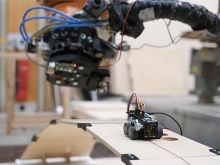Computational Design and Simulation
First Meeting: 21.10.2021, 9:45, room 9.06
The Behavioral Fabrication seminar introduces a new methodology for digital design and fabrication. Contrary to traditional notions of design, behavioural strategies for fabrication are not based on the execution of apriori defined abstract plans, such as detailed digital design models, but are based on the concept of execution of tasks. Tasks represent design intentions and unfold in a non-deterministic way based on the constant interaction of the machine/robot/agent with the material and its environment through sensor-actuator feedback.
This course will introduce the topic of behavioral fabrication and related computational techniques:
Agent-based Modeling
Advanced robot programming
Online robotic control methods
Methods for sensing, tracking, and mapping
At the core of the research lie the analysis, abstraction, translation and implementation of fabrication-oriented behaviours for the production of physical prototypes. Students are expected to have a high degree of proficiency in computer programming (either in C# or in Python). It is recommended to take this course after having taken Robotic Fabrication, also offered by ICD.
In this semester, we will again combine elements of "asynchronous" and "synchronous" teaching in order to cover the different teaching formats, such as lectures, tutorials, workshops, Q&As, desk crits, and reviews. Lecture contents will be provided "asynchronously" as pre-recorded videos on ILIAS, which means that you can watch and re-watch them at your own pace. There will also be a "forum", where you can ask specific questions about lectures, assignments, and seminar logistics, which we will answer in between live sessions.
We will have weekly live sessions either in person or via WebEx, where we will discuss the contents, respond to questions, do tutorials, workshops, desk crits, and reviews in "synchronous" mode. Currently, we are also planning on providing "in person" access to the Robolab, provided that the then-valid Corona regulations allow for it. This will mostly be relevant in the second half of the semester.


